- Home
- Raymond Chandler
The Lady in the Lake Page 6
The Lady in the Lake Read online
Page 6
“I carried it a month,” Bill Chess growled. “Who told you she left me before?”
“I forget,” Patton said. “You know how it is in a place like this. Not much folks don’t notice. Except maybe in summertime where there’s a lot of strangers about.”
Nobody said anything for a while and then Patton said absently: “June 12th you say she left? Or you thought she left? Did you say the folks across the lake were up here then?”
Bill Chess looked at me and his face darkened again. “Ask this snoopy guy—if he didn’t already spill his guts to you.”
Patton didn’t look at me at all. He looked at the line of mountains far beyond the lake. He said gently: “Mr. Marlowe here didn’t tell me anything at all, Bill, except how the body come up out of the water and who it was. And that Muriel went away, as you thought, and left a note you showed him. I don’t guess there’s anything wrong in that, is there?”
There was another silence and Bill Chess stared down at the blanket-covered corpse a few feet away from him. He clenched his hands and a thick tear ran down his cheek.
“Mrs. Kingsley was here,” he said. “She went down the hill that same day. Nobody was in the other cabins. Perrys and Farquars ain’t been up at all this year.”
Patton nodded and was silent. A kind of charged emptiness hung in the air, as if something that had not been said was plain to all of them and didn’t need saying.
Then Bill Chess said wildly: “Take me in, you sons of bitches! Sure I did it! I drowned her. She was my girl and I loved her. I’m a heel, always was a heel, always will be a heel, but just the same I loved her. Maybe you guys wouldn’t understand that. Just don’t bother to try. Take me in, damn you!”
Nobody said anything at all.
Bill Chess looked down at his hard brown fist. He swung it up viciously and hit himself in the face with all his strength.
“You rotten son of a bitch,” he breathed in a harsh whisper.
His nose began to bleed slowly. He stood and the blood ran down his lip, down the side of his mouth, to the point of his chin. A drop fell sluggishly to his shirt.
Patton said quietly: “Got to take you down the hill for questioning, Bill. You know that. We ain’t accusing you of anything, but the folks down there have got to talk to you.”
Bill Chess said heavily: “Can I change my clothes?”
“Sure. You go with him, Andy. And see what you can find to kind of wrap up what we got here.”
They went off along the path at the edge of the lake. The doctor cleared his throat and looked out over the water and sighed.
“You’ll want to send the corpse down in my ambulance, Jim, won’t you?”
Patton shook his head. “Nope. This is a poor county, Doc. I figure the lady can ride cheaper than what you get for that ambulance.”
The doctor walked away from him angrily, saying over his shoulder: “Let me know if you want me to pay for the funeral.”
“That ain’t no way to talk,” Patton sighed.
NINE
The Indian Head Hotel was a brown building on a corner across from the new dance hall. I parked in front of it and used its rest room to wash my face and hands and comb the pine needles out of my hair, before I went into the dining-drinking parlor that adjoined the lobby. The whole place was full to overflowing with males in leisure jackets and liquor breaths and females in high-pitched laughs, oxblood fingernails and dirty knuckles. The manager of the joint, a low-budget tough guy in shirt-sleeves and a mangled cigar, was prowling the room with watchful eyes. At the cash desk a pale-haired man was fighting to get the war news on a small radio that was as full of static as the mashed potatoes were full of water. In the deep back corner of the room, a hillbilly orchestra of five pieces, dressed in ill-fitting white jackets and purple shirts, was trying to make itself heard above the brawl at the bar and smiling glassily into the fog of cigarette smoke and the blur of alcoholic voices. At Puma Point, summer, that lovely season, was in full swing.
I gobbled what they called the regular dinner, drank a brandy to sit on its chest and hold it down, and went out on to the main street. It was still broad daylight but some of the neon signs had been turned on, and the evening reeled with the cheerful din of auto horns, children screaming, bowls rattling, skeeballs clunking, .22’s snapping merrily in shooting galleries, juke boxes playing like crazy, and behind all this out on the lake the hard barking roar of the speedboats going nowhere at all and acting as though they were racing with death.
In my Chrysler a thin, serious-looking, brown-haired girl in dark slacks was sitting smoking a cigarette and talking to a dude ranch cowboy who sat on my running board. I walked around the car and got into it. The cowboy strolled away hitching his jeans up. The girl didn’t move.
“I’m Birdie Keppel,” she said cheerfully, “I’m the beautician here daytimes and evenings I work on the Puma Point Banner. Excuse me sitting in your car.”
“That’s all right,” I said. “You want to just sit or you want me to drive you somewhere?”
“You can drive down the road a piece where it’s quieter, Mr. Marlowe. If you’re obliging enough to talk to me.”
“Pretty good grapevine you’ve got up here,” I said and started the car.
I drove down past the post office to a corner where a blue and white arrow marked Telephone pointed down a narrow road towards the lake. I turned down that, drove past the telephone office, which was a log cabin with a tiny railed lawn in front of it, passed another small cabin and pulled up in front of a huge oak tree that flung its branches all the way across the road and a good fifty feet beyond it.
“This do, Miss Keppel?”
“Mrs. But just call me Birdie. Everybody does. This is fine. Pleased to meet you, Mr. Marlowe. I see you come from Hollywood, that sinful city.”
She put a firm brown hand out and I shook it. Clamping bobbie pins into fat blondes had given her a grip like a pair of iceman’s tongs.
“I was talking to Doc Hollis,” she said, “about poor Muriel Chess. I thought you could give me some details. I understand you found the body.”
“Bill Chess found it really. I was just with him. You talk to Jim Patton?”
“Not yet. He went down the hill. Anyway I don’t think Jim would tell me much.”
“He’s up for re-election,” I said. “And you’re a newspaper woman.”
“Jim’s no politician, Mr. Marlowe, and I could hardly call myself a newspaper woman. This little paper we get out up here is a pretty amateurish proposition.”
“Well, what do you want to know?” I offered her a cigarette and lit it for her.
“You might just tell me the story.”
“I came up here with a letter from Derace Kingsley to look at his property. Bill Chess showed me around, got talking to me, told me his wife had moved out on him and showed me the note she left. I had a bottle along and he punished it. He was feeling pretty blue. The liquor loosened him up, but he was lonely and aching to talk anyway. That’s how it happened. I didn’t know him. Coming back around the end of the lake we went out on the pier and Bill spotted an arm waving out from under the planking down in the water. It turned out to belong to what was left of Muriel Chess. I guess that’s all.”
“I understand from Doc Hollis she had been in the water a long time. Pretty badly decomposed and all that.”
“Yes. Probably the whole month he thought she had been gone. There’s no reason to think otherwise. The note’s a suicide note.”
“Any doubt about that, Mr. Marlowe?”
I looked at her sideways. Thoughtful dark eyes looked out at me under fluffed-out brown hair. The dusk had begun to fall now, very slowly. It was no more than a slight change in the quality of the light.
“I guess the police always have doubts in these cases,” I said.
“How about you?”
“My opinion doesn’t go for anything.”
“But for what it’s worth?”
“I only met Bill Chess this a
fternoon,” I said. “He struck me as a quick-tempered lad and from his own account he’s no saint. But he seems to have been in love with his wife. And I can’t see him hanging around here for a month knowing she was rotting down in the water under that pier. Coming out of his cabin in the sunlight and looking along that soft blue water and seeing in his mind what was under it and what was happening to it. And knowing he put it there.”
“No more can I,” Birdie Keppel said softly. “No more could anybody. And yet we know in our minds that such things have happened and will happen again. Are you in the real estate business, Mr. Marlowe?”
“No.”
“What line of business are you in, if I may ask?”
“I’d rather not say.”
“That’s almost as good as saying,” she said. “Besides Doc Hollis heard you tell Jim Patton your full name. And we have an L.A. city directory in our office. I haven’t mentioned it to anyone.”
“That’s nice of you,” I said.
“And what’s more, I won’t,” she said. “If you don’t want me to.”
“What does it cost me?”
“Nothing,” she said. “Nothing at all. I don’t claim to be a very good newspaper woman. And we wouldn’t print anything that would embarrass Jim Patton. Jim’s the salt of the earth. But it does open up, doesn’t it?”
“Don’t draw any wrong conclusions,” I said. “I had no interest in Bill Chess whatever.”
“No interest in Muriel Chess?”
“Why would I have any interest in Muriel Chess?”
She snuffed her cigarette out carefully into the ashtray under the dashboard. “Have it your own way,” she said. “But here’s a little item you might like to think about, if you don’t know it already. There was a Los Angeles copper named De Soto up here about six weeks back, a big roughneck with damn poor manners. We didn’t like him and we didn’t open up to him much. I mean the three of us in the Banner office didn’t. He had a photograph with him and he was looking for a woman called Mildred Haviland, he said. On police business. It was an ordinary photograph, an enlarged snapshot, not a police photo. He said he had information the woman was staying up here. The photo looked a good deal like Muriel Chess. The hair seemed to be reddish and in a very different style than she has worn it here, and the eyebrows were all plucked to narrow arches, and that changes a woman a good deal. But it did look a good deal like Bill Chess’s wife.”
I drummed on the door of the car and after a moment I said, “What did you tell him?”
“We didn’t tell him anything. First off, we couldn’t be sure. Second, we didn’t like his manner. Third, even if we had been sure and I had liked his manner, we likely would not have sicked him on to her. Why would we? Everybody’s done something to be sorry for. Take me. I was married once—to a professor of classical languages at Redlands University.” She laughed lightly.
“You might have got yourself a story,” I said.
“Sure. But up here we’re just people.”
“Did this man De Soto see Jim Patton?”
“Sure, he must have. Jim didn’t mention it.”
“Did he show you his badge?”
She thought and then shook her head. “I don’t recall that he did. We just took him for granted, from what he said. He certainly acted like a tough city cop.”
“To me that’s a little against his being one. Did anybody tell Muriel about this guy?”
She hesitated, looking quietly out through the windshield for a long moment before she turned her head and nodded.
“I did. Wasn’t any of my damn business, was it?”
“What did she say?”
“She didn’t say anything. She gave a funny little embarrassed laugh, as if I had been making a bad joke. Then she walked away. But I did get the impression that there was a queer look in her eyes, just for an instant. You still not interested in Muriel Chess, Mr. Marlowe?”
“Why should I be? I never heard of her until I came up here this afternoon. Honest. And I never heard of anybody named Mildred Haviland either. Drive you back to town?”
“Oh no, thanks. I’ll walk. It’s only a few steps. Much obliged to you. I kind of hope Bill doesn’t get into a jam. Especially a nasty jam like this.”
She got out of the car and hung on one foot, then tossed her head and laughed. “They say I’m a pretty good beauty operator,” she said. “I hope I am. As an interviewer I’m terrible. Goodnight.”
I said goodnight and she walked off into the evening. I sat there watching her until she reached the main street and turned out of sight. Then I got out of the Chrysler and went over towards the telephone company’s little rustic building.
TEN
A tame doe deer with a leather dog collar on wandered across the road in front of me. I patted her rough hairy neck and went into the telephone office. A small girl in slacks sat at a small desk working on the books. She got me the rate to Beverly Hills and the change for the coin box. The booth was outside, against the front wall of the building.
“I hope you like it up here,” she said. “It’s very quiet, very restful.”
I shut myself into the booth. For ninety cents I could talk to Derace Kingsley for five minutes. He was at home and the call came through quickly but the connection was full of mountain static.
“Find anything up there?” he asked me in a three-highball voice. He sounded tough and confident again.
“I’ve found too much,” I said. “And not at all what we want. Are you alone?”
“What does that matter?”
“It doesn’t matter to me. But I know what I’m going to say. You don’t.”
“Well, get on with it, whatever it is,” he said.
“I had a long talk with Bill Chess. He was lonely. His wife had left him—a month ago. They had a fight and he went out and got drunk and when he came back she was gone. She left a note saying she would rather be dead than live with him any more.”
“I guess Bill drinks too much,” Kingsley’s voice said from very far off.
“When he got back, both the women had gone. He has no idea where Mrs. Kingsley went. Lavery was up here in May, but not since. Lavery admitted that much himself. Lavery could, of course, have come up again while Bill was out getting drunk, but there wouldn’t be a lot of point to that and there would be two cars to drive down the hill. And I thought that possibly Mrs. K. and Muriel Chess might have gone away together, only Muriel also had a car of her own. But that idea, little as it was worth, has been thrown out by another development. Muriel Chess didn’t go away at all. She went down into your private lake. She came back up today. I was there.”
“Good God!” Kingsley sounded properly horrified. “You mean she drowned herself?”
“Perhaps. The note she left could be a suicide note. It would read as well that way as the other. The body was stuck down under that old submerged landing below the pier. Bill was the one who spotted an arm moving down there while we were standing on the pier looking down into the water. He got her out. They’ve arrested him. The poor guy’s pretty badly broken up.”
“Good God!” Kingsley said again. “I should think he would be. Does it look as if he—” He paused as the operator came in on the line and demanded another forty-five cents. I put in two quarters and the line cleared.
“Look as if he what?”
Suddenly very clear, Kingsley’s voice said: “Look as if he murdered her?”
I said: “Very much. Jim Patton, the constable up here, doesn’t like the note not being dated. It seems she left him once before over some woman. Patton sort of suspects Bill might have saved up an old note. Anyhow they’ve taken Bill down to San Bernardino for questioning and they’ve taken the body down to be post-mortemed.”
“And what do you think?” he asked slowly.
“Well, Bill found the body himself. He didn’t have to take me around by that pier. She might have stayed down in the water very much longer, or forever. The note could be old because Bill had carried
it in his wallet and handled it from time to time, brooding over it. It could just as easily be undated this time as another time. I’d say notes like that are undated more often than not. The people who write them are apt to be in a hurry and not concerned with dates.”
“The body must be pretty far gone. What can they find out now?”
“I don’t know how well equipped they are. They can find out if she died by drowning, I guess. And whether there are any marks of violence that wouldn’t be erased by water and decomposition. They could tell if she had been shot or stabbed. If the hyoid bone in the throat was broken, they could assume she was throttled. The main thing for us is that I’ll have to tell why I came up here. I’ll have to testify at an inquest.”
“That’s bad,” Kingsley growled. “Very bad. What do you plan to do now?”
“On my way home I’ll stop at the Prescott Hotel and see if I can pick up anything there. Were your wife and Muriel Chess friendly?”
“I guess so. Crystal’s easy enough to get along with most of the time. I hardly knew Muriel Chess.”
“Did you ever know anybody named Mildred Haviland?”
“What?” I repeated the name.
“No,” he said. “Is there any reason why I should?”
“Every question I ask you ask another right back,” I said. “No, there isn’t any reason why you should know Mildred Haviland. Especially if you hardly knew Muriel Chess. I’ll call you in the morning.”
“Do that,” he said, and hesitated. “I’m sorry you had to walk into such a mess,” he added, and then hesitated again and said goodnight and hung up.
The bell rang again immediately and the long-distance operator told me sharply I had put in five cents too much money. I said the sort of thing I would be likely to put into an opening like that. She didn’t like it.
I stepped out of the booth and gathered some air into my lungs. The tame doe with the leather collar was standing in the gap in the fence at the end of the walk. I tried to push her out of the way, but she just leaned against me and wouldn’t push. So I stepped over the fence and went back to the Chrysler and drove back to the village.

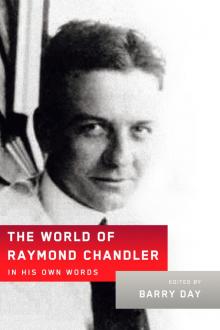 The World of Raymond Chandler: In His Own Words
The World of Raymond Chandler: In His Own Words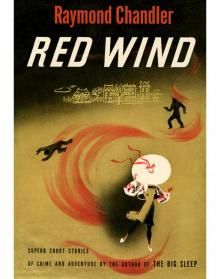 Red Wind: A Collection of Short Stories
Red Wind: A Collection of Short Stories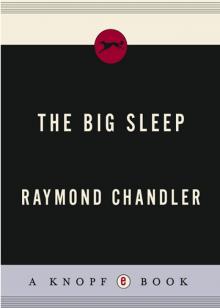 The Big Sleep
The Big Sleep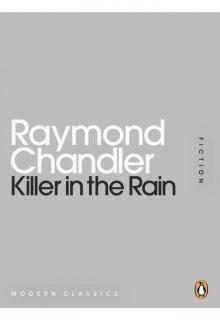 Killer in the Rain
Killer in the Rain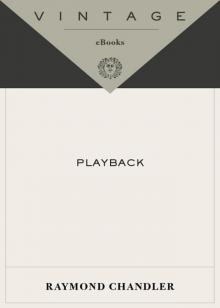 Playback
Playback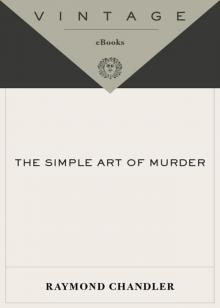 The Simple Art of Murder
The Simple Art of Murder The Bronze Door
The Bronze Door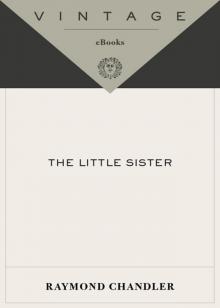 The Little Sister
The Little Sister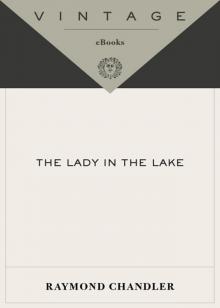 The Lady in the Lake
The Lady in the Lake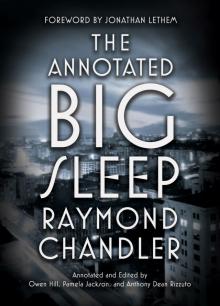 The Annotated Big Sleep
The Annotated Big Sleep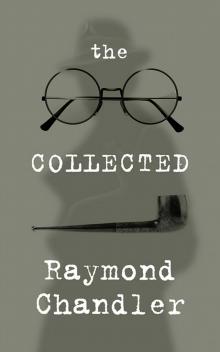 The Collected Raymond Chandler
The Collected Raymond Chandler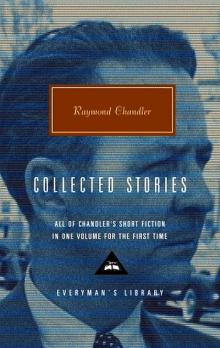 Collected Stories (Everyman's Library)
Collected Stories (Everyman's Library)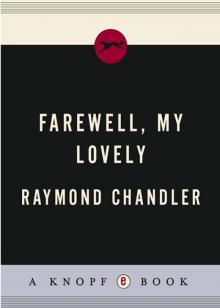 Farewell, My Lovely
Farewell, My Lovely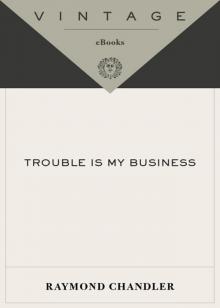 Trouble Is My Business
Trouble Is My Business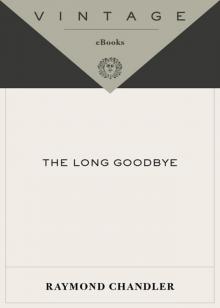 The Long Goodbye
The Long Goodbye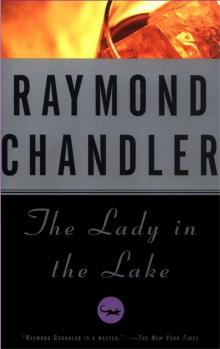 The Lady in the Lake pm-4
The Lady in the Lake pm-4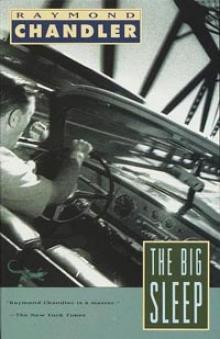 The Big Sleep pm-1
The Big Sleep pm-1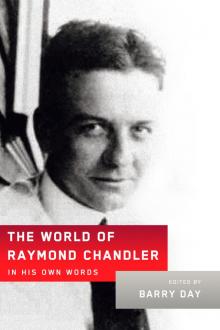 The World of Raymond Chandler
The World of Raymond Chandler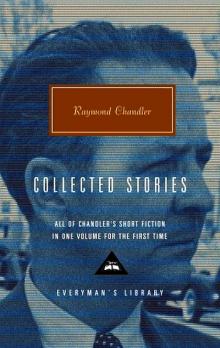 Collected Stories of Raymond Chandler
Collected Stories of Raymond Chandler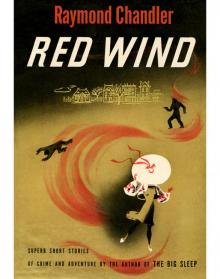 Red Wind
Red Wind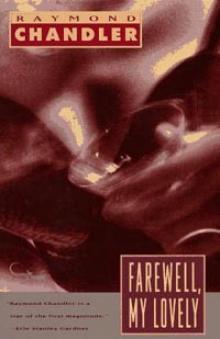 Farewell, My Lovely pm-2
Farewell, My Lovely pm-2 The Raymond Chandler Papers: Selected Letters and Nonfiction, 1909–1959
The Raymond Chandler Papers: Selected Letters and Nonfiction, 1909–1959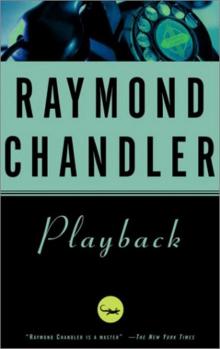 Playback pm-7
Playback pm-7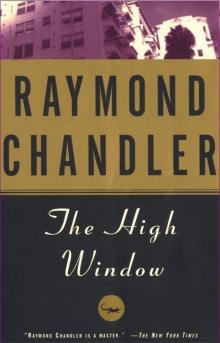 The High Window pm-3
The High Window pm-3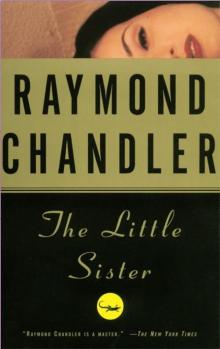 The Little Sister pm-5
The Little Sister pm-5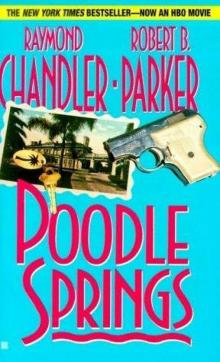 Poodle Springs (philip marlowe)
Poodle Springs (philip marlowe)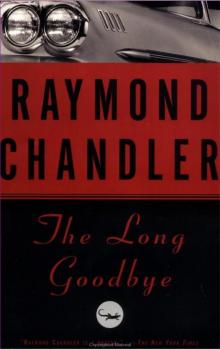 The Long Goodbye pm-6
The Long Goodbye pm-6